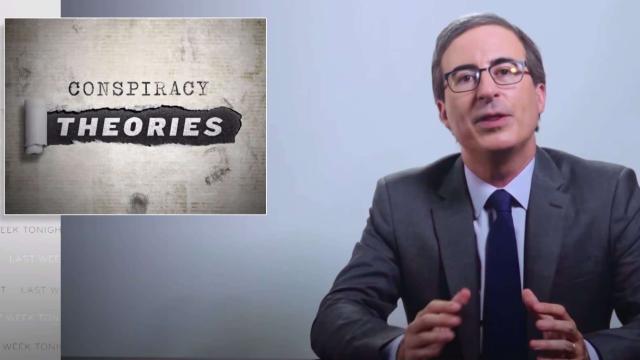Thanks in no small part to COVID-19, we have found ourselves in a golden age of conspiracy theories. With so much still unknown about the novel coronavirus, whenever we add a piece to the pandemic puzzle through evidence-based medicine and research — especially if the new information contradicts our earlier thinking — it’s understandable why some people question it. To complicate matters further, we all suffered through the initial mixed messaging about wearing face masks, not to mention confusion over the purpose of quarantining and the timing of various lockdowns, reopenings and, now, re-closings. This is all to say that with what we know about COVID-19 changing so rapidly, it’s no wonder it can be difficult to know what to believe.
On Sunday’s episode of Last Week Tonight with John Oliver, John Oliver addresses COVID conspiracy theories head-on, including offering suggestions for how we can most effectively communicate with people in our lives who believe them. Here’s what to know.
Ask yourself these three questions about your information
Before trying to convince someone that they’re wrong, Oliver recommends that we ask ourselves three questions to ensure we’re approaching our own information critically. “It’s going to be incumbent upon us as individuals to try and stop these theories and treat them with a sceptical eye before we believe, or indeed, spread them around,” he explains. Here’s what we need to consider:
- Is there a rational, non-conspiracy-based explanation?
- Has this been held up to scrutiny by experts, and if so, what did those experts say?
- How plausible is this conspiracy as a practical matter?
In the episode, Oliver goes into additional detail as he answers each question and provides examples:
Use empathy, not shame
Now let’s say your own belief in something as a fact has passed the three-question test above, and you’ve encountered someone who is genuinely convinced that a conspiracy theory is the truth. If you’ve attempted to have these conversations before, you know that it doesn’t typically end with the other person changing their mind and thanking you for enlightening them.
Even though having a reasonable conversation with someone who doesn’t find science convincing may be a challenge, Oliver says that at this point, we can at least try. “You can’t reach everyone, but you can reach some, and now, more than ever, it might be important for you to try — which clearly is not easy,” he says.
Oliver emphasises that how you approach the person is also incredibly important; namely, you need to communicate using empathy, not shame. “What experts say is that the most effective way to approach someone is not by shaming them for believing something, or overwhelming them with counter-evidence, but to try and be empathetic, meet them where they are, and nudge them to think a bit more critically,” he explains.
Is it your job to personally seek out people who believe everything they saw in “Plandemic” or that 5G is causing the coronavirus? Definitely not. But if you happen to know/love/come across someone who might be a COVID conspiracy theorist or who is just not sure which news sources to trust, Oliver’s techniques could potentially make a difference.
If not, he has also enlisted trusted celebrities like Alex Trebek, Catherine O’Hara, Billy Porter, Paul Rudd and John Cena to record brief PSAs about the importance of critical thinking, all of which can be found on TheTrueTrueTruth.com.

Leave a Reply
You must be logged in to post a comment.